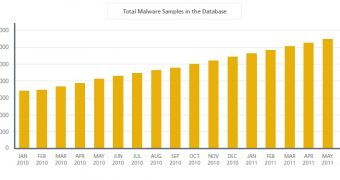McAfee recently released a second quarter report for 2011 in which they highlight the challenges posed by hacktivist groups such as LulzSec and Anonymous.
One of the most important changes that occurred in the malware security field was that mobile platforms became more targeted. In the first quarter of 2011, Android was the third most targeted mobile platform, but now it has moved to first place, with Java Micro Edition following up in second position.
As for cybercrime activities, the number of email address books up for sale to spammers has increased.
Prices for these enterprises vary according to location. For instance, in the United States, an address book containing 1.000.000 addresses costs $25, while in Turkey the same number of addresses costs $50.
In the past quarter, new products were discovered among exploit kits, the most notable being Eleonore Version 1.6.5, with two 2011 exploits, and Best Pack, with one 2011 exploit.
On the good side, law enforcement around the world has continued making progress against the threats imposed by cybercriminals. Their united efforts with security providers has lead to a significant decrease in the number of messaging threats.
McAfee stated in the report that this was the busiest first half-year, with a 22 percent increase compared to the same period of 2010. During this quarter, 6 million unique malware samples were identified.
According to the same report, fake anti-virus software is continuing to show consistent growth and because there are more Mac users than ever before, fake AV for Apple computing products has become a reality. It is just a matter of time until this type of malware makes its way to iPads and iPhones.
A growth in stealth malware has also been recorded. These rootkit codes hide in the elements of the operating system or the security software and they are used to make other malware stealthier and more persistent.
Finally, reports regarding email spam say that we are witnessing an all-time low, due to Rustock's shutdown. However, it is expected that the number of email spam messages will slowly rise again in the near future.

 14 DAY TRIAL //
14 DAY TRIAL //